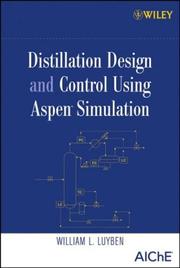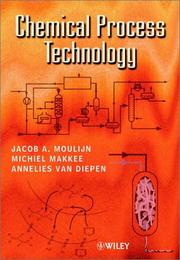| Listing 1 - 4 of 4 |
Sort by
|
Book
ISBN: 9028902716 9789028902718 Year: 1981 Publisher: Kapellen De Nederlandsche Boekhandel
Abstract | Keywords | Export | Availability | Bookmark
 Loading...
Loading...Choose an application
- Reference Manager
- EndNote
- RefWorks (Direct export to RefWorks)
Legs Homès - Van Schoor
#BSCH: vak: aardrijkskunde --- Aardgas --- Aardolie --- Borinage --- Bruinkool --- Energie --- Energiebronnen --- Energiecrisis --- Industrie --- OPEC --- Olieraffinage --- Steenkool --- aardrijkskunde --- handboeken M.O. --- reeks Ontdek de wereld --- Schoolbooks - Didactic material --- Algemeen --- Algemeen. --- Didactics of economy --- handboeken M.O --- Didactics of secundary education

ISBN: 0471778885 9780471778882 Year: 2006 Publisher: Hoboken, N.J. Wiley
Abstract | Keywords | Export | Availability | Bookmark
 Loading...
Loading...Choose an application
- Reference Manager
- EndNote
- RefWorks (Direct export to RefWorks)
As the world continues to seek new sources of energy, the distillation process remains one of the most important separation methods in the chemical, petroleum, and energy industries. And as new renewable sources of energy and chemical feedstocks become more universally utilized, the issues of distillation design and control will remain vital to a future sustainable lifestyle. Distillation Design and Control Using Aspen Simulation introduces the current status and future implications of this vital technology from the dual perspectives of steady-state design and dynamics. Where traditional design texts have focused mainly on the steady-state economic aspects of distillation design, William Luyben also addresses such issues as dynamic performance in the face of disturbances. Utilizing the commercial simulators Aspen Plus and Aspen Dynamics, the text guides future and practicing chemical engineers first in the development of optimal steady-state designs of distillation systems, and then in the development of effective control structures. Unique features of the text include: - In-depth coverage of the dynamics of column design to help develop effective control structures for distillation columns - Development of rigorous simulations of single distillation columns and sequences of columns - Coverage of design and control of petroleum fractionators - Encompassing nearly four decades of research and practical developments in this dynamic field, the text represents an important reference for both students and experienced engineers faced with distillation problems.
Chemical process control --- Distillation apparatus --- aspen plus --- distillatie (destillatie) --- distillatiekolom (destillatiekolom) --- dynamische simulatie --- fractionatie --- olieraffinage --- procescontrole --- procesoptimalisatie --- processimulatie --- 66.021.3 --- 66.048 --- Process control --- Distilling apparatus --- Stills --- Chemical apparatus --- 66.048 Distillation --- Distillation --- Simulation methods --- Design and construction --- Mass transfer, exchange in general --- Chemical technology --- destillatie --- chemische procescontrole --- simulaties

ISBN: 9783527316724 3527316728 Year: 2007 Publisher: Weinheim : Wiley-VCH,
Abstract | Keywords | Export | Availability | Bookmark
 Loading...
Loading...Choose an application
- Reference Manager
- EndNote
- RefWorks (Direct export to RefWorks)
Catalysis. --- Chemical kinetics. --- Catalyse --- Cinétique chimique --- Catalysis --- Chemical kinetics --- katalyse --- kinetica --- kinetische energie --- petrochemie --- olieraffinage --- brandstofcel --- waterstof --- oppervlaktechemie --- spectroscopie --- Cinétique chimique --- Chemical reaction, Kinetics of --- Chemical reaction, Rate of --- Chemical reaction, Velocity of --- Chemical reaction rate --- Chemical reaction velocity --- Kinetics, Chemical --- Rate of chemical reaction --- Reaction rate (Chemistry) --- Velocity of chemical reaction --- Chemical affinity --- Reactivity (Chemistry) --- Activation (Chemistry) --- Chemistry, Physical and theoretical --- Surface chemistry

ISBN: 0471630624 0471630098 9780471630098 9780471630623 Year: 2001 Publisher: Chichester John Wiley & Sons, Ltd
Abstract | Keywords | Export | Availability | Bookmark
 Loading...
Loading...Choose an application
- Reference Manager
- EndNote
- RefWorks (Direct export to RefWorks)
Chemical Process Technology is a comprehensive introduction, examining both the fundamental concepts and applied nature of this subject. Modern process development relies on a knowledge of many different disciplines and an application and integration of this knowledge. Chemical Process Technology provides an essential bridge between the chemical sciences and the chemical industry. It enables the reader to integrate fundamental knowledge of the basic disciplines, to understand the most important chemical processes, and to apply this knowledge and understanding to industrial processes. This innovative textbook examines both large-scale and small-scale chemical and biotechnology industries and aims to bring to life the concepts that form the basis of the process industry. Starting with a general look at the industry, subsequent chapters examine different processes in greater detail. Emphasis tends to be placed on chemical reactions and the reactor, both at the heart of each process, but coverage also includes feed pre-treatment and product separation.
Chemical processes --- alkeen --- batchreactor --- biotechnologie --- chemische procesindustrie --- katalyse --- kolenvergassing --- olieraffinage --- polymerisatie --- procesontwerp --- procestechnologie --- 66.01 --- 662.7 --- bulkproducten --- chemicaliën --- chemische technologie --- fijnchemicaliën --- petroleum --- raffinage --- Processes, Chemical --- Chemical engineering --- Chemical reactions --- Manufacturing processes --- 66.01 Chemical engineering and processing principles. Process design and control. Plant layout and services. Materials, properties etc. --- Chemical engineering and processing principles. Process design and control. Plant layout and services. Materials, properties etc. --- (zie ook: ontwerpproces) --- Grondslagen van de chemische technologie --- Brandstoftechnologie. Behandelde brandstoffen --- Chemical engineering and processing principles. Process design and control. Plant layout and services. Materials, properties etc --- Chemical technology --- Biotechnology --- chemische processen --- bioengineering --- Chemical processes. --- Catalysis --- Cracking (reaction) --- Petroleum refining --- Polymerization --- Process engineering --- Synthesis gas manufacturing
| Listing 1 - 4 of 4 |
Sort by
|

 Search
Search Feedback
Feedback About UniCat
About UniCat  Help
Help News
News